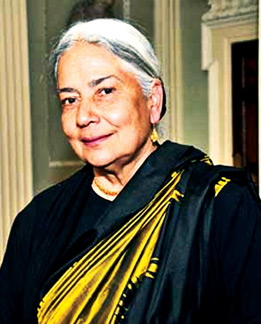|
Anita Desai :
Human complexities thru psychological analysis
by W.T.J.S. Kaviratne - Ambalangoda Spl. Cor.
Anita Desai (Anita Muzumadar Desai) is an Indian novelist, short
story and screen writer born in Mussorie, India to a German mother and a
Bengali businessman D.N. Mazumdar.
She spoke five languages such as German, Bengali,Urdu, Hindi and
English.
|

Anita Desai |
At the age of nine she wrote her first story.
She got married to Asvin Desai a director of a computer software
company.
She was highly influenced by Virginia Woolf's Wuthering Heights,
works of Nikolai Gogol, D.H. Lawrence and philosophical thoughts of
existentialism in the portrayal of characters in her fiction.
Anita Desai is recognised as the 'Mother of Indian psychological
novel genre in recognition of her approach of the psychological
explorations she has done in her depiction of characters in her novels
centred around India.
Anita Desai has used poetic language in her novels and she has said
that she has turned to poetry for model and in her own words "It's more
and more poetry I use as a model.
I'm more interested now in reading poetry than fiction. I think they
use language in a way I would like to emulate. "
Human relationship
Complexity of human relationship has been identified as the most
striking theme of her novels and she has made a very successful attempt
in doing a deeper exploration of human psyche and through her characters
in her novels she has unraveled the mysterious inner lives before the
readers.
Almost all plots of her novels are based on the silent inner
sufferings of women under the inhumane male domination of insensitive
husbands, fathers and brothers.
Anita Desai has portrayed the majority of her male characters in her
novels as responsible for the alienation of women.
As a consequence of withdrawal, loneliness, isolation, lack of
communication and disintegration of the female protagonists portrayed in
Anita Desai's novels finally culminated in tragedy and disaster.
In 'The Novels of Anita Desai - A Critical Study' by M. Rajeshwar and
Manmohan K. Bhatnagar making observations on Anita Desai said, "her main
engagement is to study human existence and human predicament."
Her explorations in her novels are a quest for self. 'She is the
novelist of psycho-emotional situations and her theme is the individual
against himself and against the milieu.'
Psychosomatic
Anita Desai's almost all female characters have been portrayed as
affected by inner psychological sufferings of tension, worries,
disappointment, anxiety and fear. Female characters in Anita Desai's
novels appeared to be highly sensitive and live in their own inner dream
world comprised of hallucinations and their own imaginations thus
completely alienated from reality and their environment.
In addition, Anita Desai is a staunch proponent of the belief that
better understanding between the husband the wife and the psychological
adjustment of both partners are of paramount importance for the success
of married life.
Characters of her novels lacking of better emotional understanding
and psychological adjustments ended in tragedies.
'Cry the Peacock' vividly portrays how the female character gradually
degenerated psychosomatic condition and failed miserably to adjust
herself to the practical nature of her husband.
Maya the central female character of Anita Desai's novel 'Cry the
Peacock' appeared to be a complete contrast of her husband Gautama.
Maya is portrayed as dreamy and sensitive while her husband Gautama
is portrayed as realistic, rational, insensitive and detached and both
of them appeared to be poles apart.
Due to incompatible temperament, the married life of Maya and Gautama
became strained. Anita Desai has dealt on the issues of love, marriage
and sex in her novels.
In the novel 'Cry the Peacock' Maya is portrayed as character
believing on fate and superstition.
After the prophecy made by an albino astrologer that in the end of
four years of their marriage she and her husband would die, she led a
life of horror.
Anita Desai has probed into the suppressed hostility in her
unconscious mind against her husband.
Denial of sexual gratification of Maya by her husband Gautama has
been vividly exposed in the novel.
In Maya's own words, "Telling me to go to sleep while he worked at
his papers, he did not give another thought of me, to either soft
willing body or the lonely, wanting mind that waited near his bed."
Due to frustration, strained relationship and alienation developed
and matured even to the extent of criminal instincts in Maya to kill her
husband Gautama and to commit suicide.
Playing the role of an efficient and sensitive psychiatrist, Anita
Desai in her novel 'Cry the Peacock' has made a psychological
exploration on the neurotic Maya, her emotional background and her life
style that she led at home under the loving care of her father.
Anita Desai's novel 'Voices of the City' (1965) portrays alienation,
loneliness, and loss of identity. In the characters of brother, two
sisters and their mother who had developed a relationship with Major
Chadha.
Nirod the main character in this novel is worried of his mother's
relationship with Major Chadha and the tragedy is based on love-hate
relationship with his mother. |

